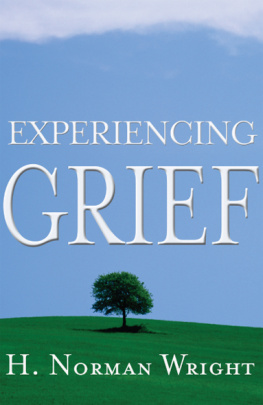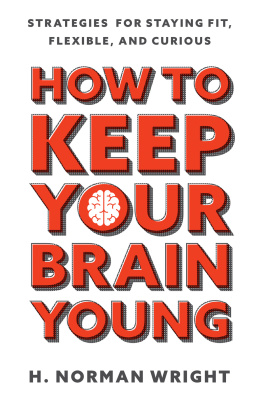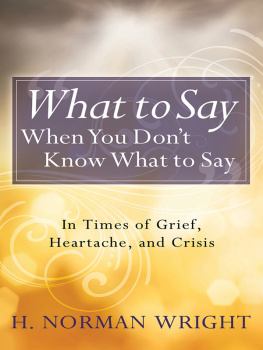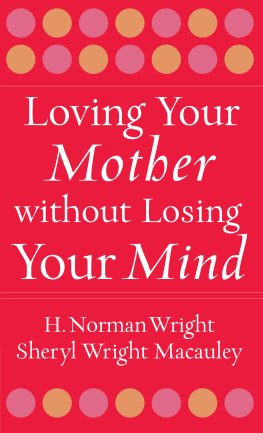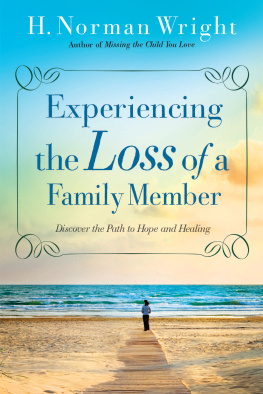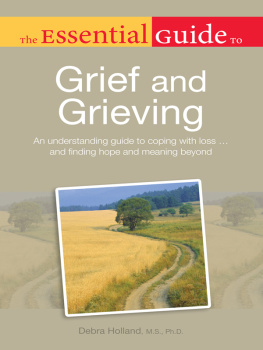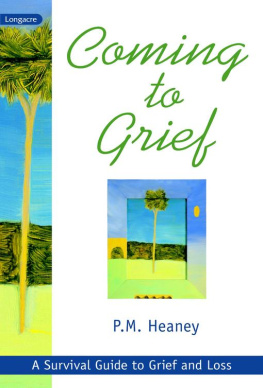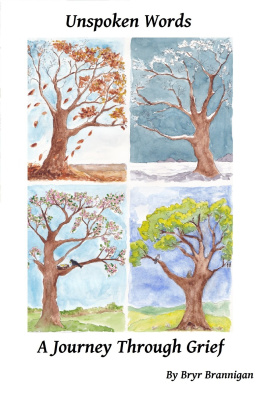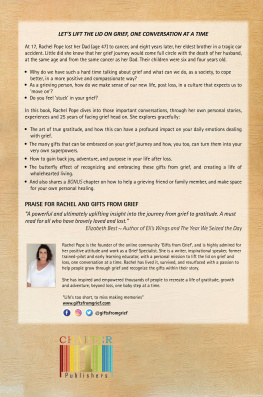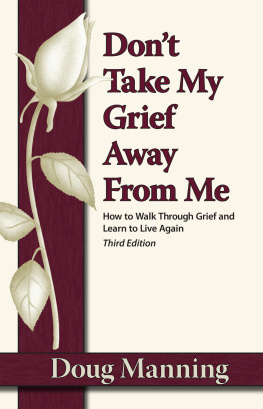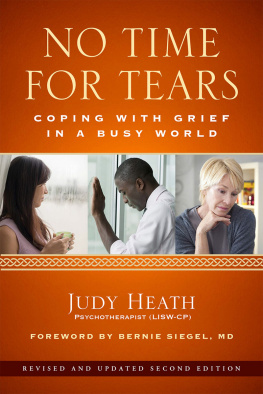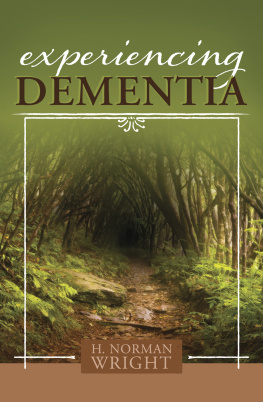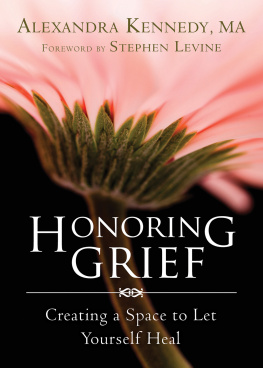H. Norman Wright - Experiencing Grief
Here you can read online H. Norman Wright - Experiencing Grief full text of the book (entire story) in english for free. Download pdf and epub, get meaning, cover and reviews about this ebook. year: 2004, publisher: B&H Publishing Group, genre: Religion. Description of the work, (preface) as well as reviews are available. Best literature library LitArk.com created for fans of good reading and offers a wide selection of genres:
Romance novel
Science fiction
Adventure
Detective
Science
History
Home and family
Prose
Art
Politics
Computer
Non-fiction
Religion
Business
Children
Humor
Choose a favorite category and find really read worthwhile books. Enjoy immersion in the world of imagination, feel the emotions of the characters or learn something new for yourself, make an fascinating discovery.
- Book:Experiencing Grief
- Author:
- Publisher:B&H Publishing Group
- Genre:
- Year:2004
- Rating:3 / 5
- Favourites:Add to favourites
- Your mark:
- 60
- 1
- 2
- 3
- 4
- 5
Experiencing Grief: summary, description and annotation
We offer to read an annotation, description, summary or preface (depends on what the author of the book "Experiencing Grief" wrote himself). If you haven't found the necessary information about the book — write in the comments, we will try to find it.
At one time or another, we will all find ourselves facing a dark journeythe passage through grief. Experiencing Grief is written for a person who is in the wake of despair grief leaves. This brief but powerful book will help lead readers out of their grief experience through five stages of grief. At the end of the journey is peace and a seasoned, more mature faith.
Experiencing Grief — read online for free the complete book (whole text) full work
Below is the text of the book, divided by pages. System saving the place of the last page read, allows you to conveniently read the book "Experiencing Grief" online for free, without having to search again every time where you left off. Put a bookmark, and you can go to the page where you finished reading at any time.
Font size:
Interval:
Bookmark:

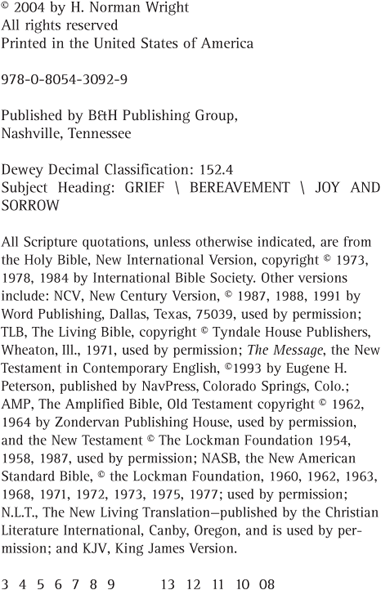

I will never forget the words, In the next hour your son's heart and lungs will fail. There was such a sense of loss, helplessness, and finality. We had experienced a life of losses with him because he was disabled, but this was different. Throughout our lifetime we will experience the loss of friends and family members. Every loss brings pain and disruption of life. Death is no stranger to any of us, but the closer one is to you the greater the impact.
A common thread links us all together no matter who we are. It's called griefthe walk through the valley of shadows. It's a journey that is imposed upon us. It's not one of choice. We can fight it, struggle through it, or embrace it. Unfortunately, many don't understand it, which increases their level of discomfort.
My purpose in writing this book is to help you progress through this journey with a greater sense of comfort and hope. It may not make it easier, for grief is workand sometimes very hard work.
I'm indebted to the hundreds of grieving people I've sat with over the years. It is their journey, their insights and wisdom and struggles that have taught me more about grief than my own experience.
If you're reading this book, you're probably somewhere on the path of grief. I hope this book helps to answer your questions, keep you on track when you tend to stumble, understand what to expect, and normalize what you are experiencing. If this occurs, then the crafting of this book has met its purpose.

I n a culture that doesn't like to acknowledge loss or talk about the impact, it's difficult to grieve. And when we add this silence to the fact that most of us have never been taught about the process and normalcy of grief, no wonder we struggle.
Perhaps you experienced what many have: you've been encouraged to have lite grief. Get over it as soon as possible. Isn't it time for you to move on with your life? There are messages that increase the pain of grief.
If you are reading this book, you're probably experiencing grief and searching for some answers. Perhaps you sought support and assistance in this journey, but it's been difficult to discover others who can help rather than hinder. Others may have already tried to fix you. Just remember, you don't need to be fixed. What could be needed is a greater understanding of the various faces of grief, what you can expect in the future, and what you can do to move forward.
This book was written out of a sense of need for everyone to understand the process and normalcy of grief. Many feel they're odd or different or even losing their senses. They believe, I'm the only one to experience this. If you feel that way, you're not alone. It's just that many don't talk about their grief or can't tell you what to expect.
Let this book be your guide. Through twenty or so brief chapters, you will learn what grief is, what you can expect to experience, how to embrace your grief, and the steps to recovery. You can also realize you're not the only one to feel this way. My hope is that through the illustrations and information, you will discover that you are normal. Take your time. Read what you need. Go back and read again. Ask a friend to read aloud to you. You may not connect the first time you read a portion or remember it. It's all right. That's your grief. It does that to us. It overshadows our abilities and changes the way we see life. It's heavy. It weighs us down and deadens our senses. And it lasts far longer than we want. But learn from it. It's a great teacher. You and I will be different because of our grief. Your walk with God may also be differenteven deeper, as it was with Job.
My ears had heard of you before, but now my eyes have seen you. (Job 42:5 NCV)
As you reflect on the various Scriptures and allow the truth of the Word of God to be your companion, I pray that you will experience his comfort.
CHAPTER 1

T he world is full of faces. Some familiar, some unfamiliar. Many are constant companions. They belong to those closest to usa friend, a parent, a grandparent, a spouse, or a child. But one day a face is missing. Its presence is no longer there. There's an empty spot, but not for long. A new face emerges to take its place. It's unfamiliar and unfriendly. It's the face of grief.
Griefwhat do you know about this experience? We use the word so easily. It's the state we're in when we've lost a loved one. It's an inward look. You've been called into the house of mourning. It's not a comfortable place. It's not where you want to reside, but for a time, longer than you wish, you will. Often it will hurt, confuse, upset, and frighten you. It's described as intense emotional suffering or even acute sorrow.
In grief the bottom falls out of your world; the solid footing you had yesterday is gone. It feels more like a floorboard tilting or soft pliable mud with each step you take. The stability of yesterday's emotions has given way to feelings that are so raw and fragile you think you are losing your mind. We feel alone with it, yet we're not for Jesus himself was there, a man of sorrows, acquainted with bitterest grief (Isa. 53:3 TLB).
Mourning is the second part of the experience. This is the process where grief is expressed. It's a natural, God-given process of recovery. It's his gift to us to help us get through the pain. Everyone has grief, but mourning is a choice. You cannot make your grief better, make it go away, fix it, or just get over it.
Before you take a journey into an unknown land, you usually consult a map. Grief is a journey that moves across unknown terrain that includes valleys and mountains, the arid desert with an occasional oasis. Most of us look at a map, and we begin a cross-country trip exploring new places. Most of us don't look at a map of the grief experience, so we end up questioning the experiences, Are these feelings normal? Am I normal? Each part of this journey can only be accomplished by moving through it. It's slow, one step at a time, and you'll hit bottom. And you're not always sure where you're going to end up, or where the journey ends.
Sometimes in your grief you may feel that you're on a crooked sidewalk, just being pushed along without being able to stop, look around, get your bearings, and decide whether this is the direction you want to go. Grief brings you into the world of the unknown.
THE WORD PICTURES OF GRIEF
There are many word pictures that others have created to describe the experience of grief. Often when we read these, we say, Yes. That's exactly the way I feel. I thought I was the only one. You're not. This is normal grief.
A grieving father said:
Grief is like a wave. It comes rolling in from a far-off place. I could no more push it back than if I were standing in the water at the beach. I could not fight the wave. It moved over me and under me and broke against me, but I could never stop it. It yielded to my presence and in so yielding arrived at its destination. It worked around me. The harder I fought it, the more exhausted I became. So it is with grief. If I tried to fight it, it would vanquish me. If I pushed
And so it is with grief. It takes you to the tops of the waves, and then they break, and you struggle in the froth of emotion. It also brings memories. It will expose who we really are inside. Waves run out of energy. As they move closer to the shore, their power is spent, and they slowly bubble up to the edge of the sand. The more we stand and fight and rail against the waves, the more exhausted we become. It's an exercise in futility. The more you accept it, hold out your arms to it, and even embrace it, the more you will recover. We need to take a step that for many of us is difficultyield. Yield to your grief. Let it do its work in your life and mourn.
Next pageFont size:
Interval:
Bookmark:
Similar books «Experiencing Grief»
Look at similar books to Experiencing Grief. We have selected literature similar in name and meaning in the hope of providing readers with more options to find new, interesting, not yet read works.
Discussion, reviews of the book Experiencing Grief and just readers' own opinions. Leave your comments, write what you think about the work, its meaning or the main characters. Specify what exactly you liked and what you didn't like, and why you think so.

